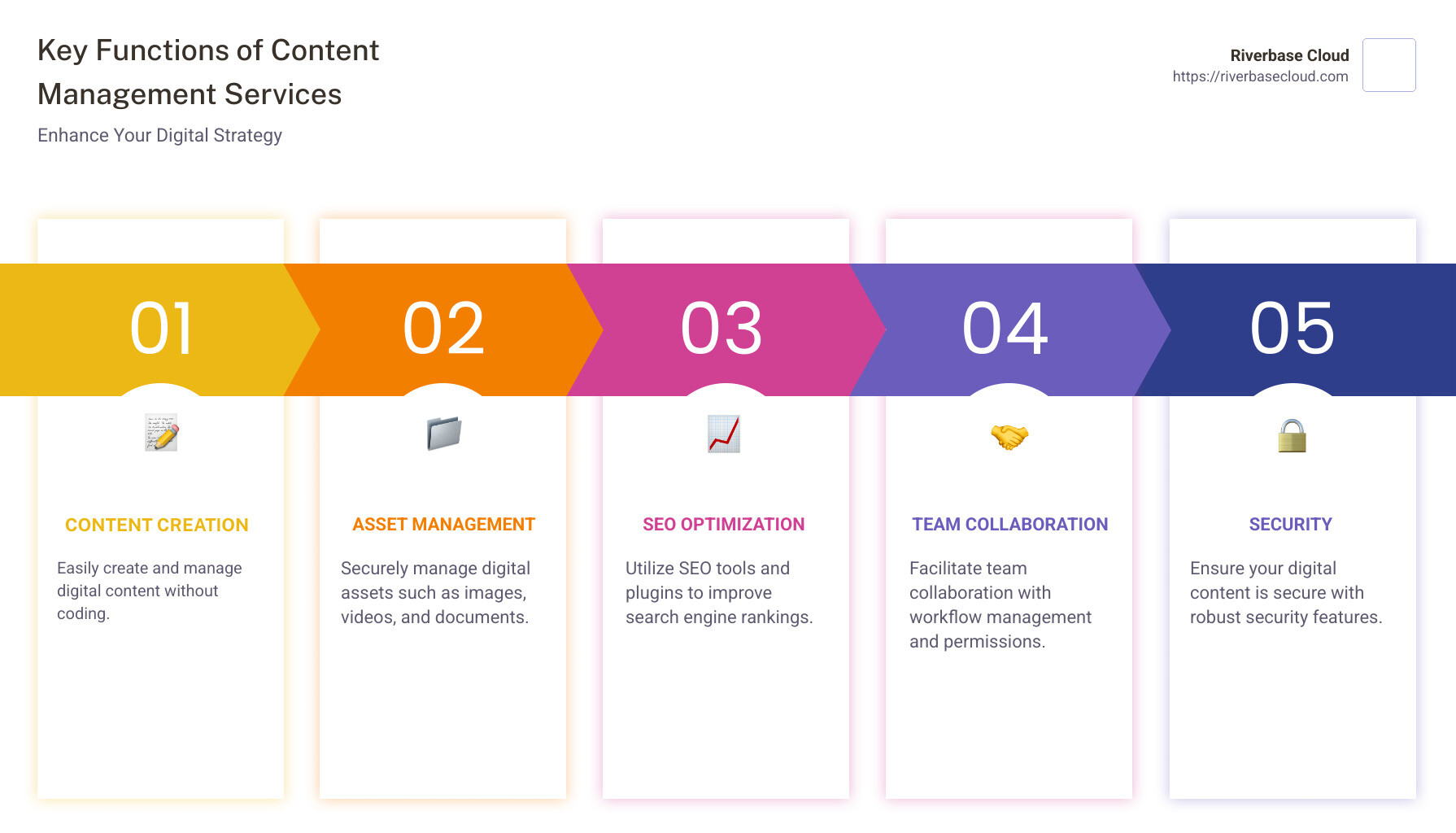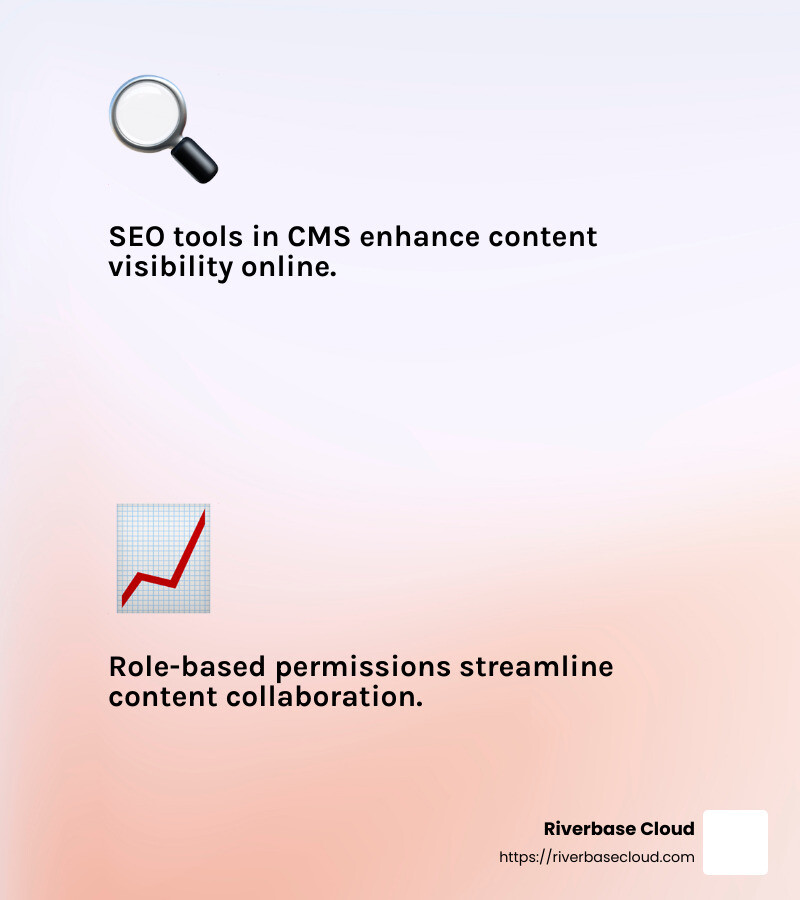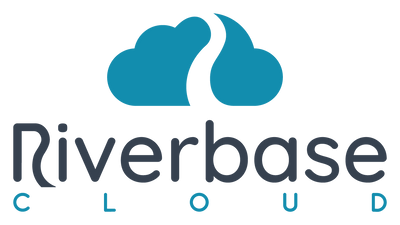Content management services have become essential for businesses navigating today's digital landscape. These services simplify the creation, management, and organization of digital content, making website management effortless. With a robust content management system (CMS), businesses can:
- Create and display content without coding
- Improve team collaboration
- Boost search engine rankings
- Securely manage digital assets
By integrating these services, businesses streamline operations and improve their digital presence. This ultimately leads to improved customer engagement and a better return on investment.

My name is Gary Gilkison, and I've spent years in digital marketing and content management, helping businesses improve their online presence. Specializing in content management services, I empower companies to optimize their digital strategies. Let's dive deeper into how these services can benefit your business!
Key content management services vocabulary:
- Website Support Services
- affordable website maintenance
- website hosting and maintenance
Understanding Content Management Systems
A content management system (CMS) is the backbone of modern website management. It allows businesses to create, manage, and publish digital content without needing to write code. This makes it accessible for everyone, from tech-savvy developers to marketing teams focused on crafting engaging content.
Key Components
Every CMS is built on two main pillars:
Content Management Application (CMA): This is the user-friendly part. Even if you're not a coder, you can add, edit, and organize content through a simple interface. Think of it as your digital canvas where you create content masterpieces.
Content Delivery Application (CDA): Once your content is ready, the CDA takes over. It ensures that your content is delivered to your audience seamlessly. This backend magic compiles and presents your content on the web.
Types of CMS
Understanding the types of CMS can help you choose the best fit for your business needs.
Coupled CMS: Also known as traditional CMS, this type combines the front-end and back-end in one system. It's great for simple websites but might limit flexibility as your needs grow.
Decoupled CMS: Here, the content management and delivery are separate. This allows more flexibility in how content is displayed across different platforms.
Headless CMS: This is a modern approach where the CMS focuses only on content creation and storage. The presentation layer is entirely separate, allowing developers to use any technology to display content. It's perfect for businesses needing to deliver content across multiple channels, like websites and mobile apps.
SaaS CMS: Software as a Service CMS is cloud-based, offering ease of access and scalability. It's ideal for businesses that want to avoid the hassle of maintaining servers.

Collaboration is a significant advantage of using a CMS. Team members can work together in real-time, making content updates and management a breeze. With role-based permissions, everyone knows their part in the content creation process, ensuring consistency and quality.
By understanding these components and types of CMS, businesses can better manage their digital content, leading to improved collaboration and enhanced user experiences.
Top Content Management Services
Choosing the right content management services is crucial for managing your digital assets and fostering collaboration. Let's explore some of the most popular CMS platforms and how to choose the right one for your needs.
Popular CMS Platforms
When it comes to CMS platforms, a few names stand out due to their popularity and functionality:
WordPress: This is the big player, powering over 40% of websites. It's user-friendly, highly customizable, and supports thousands of plugins. Whether you're a blogger or running a corporate site, WordPress offers the flexibility you need.
Drupal: Known for its scalability and security, Drupal is perfect for complex, high-traffic websites. It's used by large organizations, including government agencies, due to its robust module library and extensive customization capabilities.
Joomla: This platform offers a balance between ease of use and flexibility. It's great for both beginners and developers, providing a strong framework for building complex websites.
Squarespace: Ideal for creatives and small businesses, Squarespace offers beautifully designed templates. It's user-friendly and includes built-in sales and SEO tools, making it perfect for those who want a polished site without extensive customization.
Wix: Known for its drag-and-drop simplicity, Wix is perfect for beginners. It offers a range of templates and apps to improve functionality, with a "forever free" plan available.
Each of these platforms has its strengths, catering to different needs and preferences. Your choice will depend on your specific requirements, which we'll explore next.
Choosing the Right CMS
Selecting the best CMS for your business involves considering several factors:
1. Budget: CMS platforms range from free to subscription-based services. While WordPress offers a free plan, platforms like Squarespace and Wix provide premium features through paid plans. Consider the total cost, including web hosting, domain names, and any additional plugins or extensions.
2. Content Types: Determine what types of content you'll manage. Are you focused on text-based blog posts, or do you need to handle videos, images, and e-commerce? Platforms like Shopify (for e-commerce) or WordPress (for blogs) might be more suitable depending on your content needs.
3. Integration: Check if the CMS integrates with your existing tools, like CRM systems or web analytics. WordPress, for instance, offers plugins for almost any integration need. If you have developers, look for platforms with strong API support, like Drupal.
4. Collaboration: Ensure the CMS supports collaboration features, such as workflow management and role-based permissions. This is crucial for teams working together on content creation and updates.
By understanding your budget, content needs, and integration requirements, you can choose a CMS that aligns with your business goals. This decision will not only streamline your content management but also improve your team's collaboration and efficiency.
Next, let's explore the benefits of using content management services and how they can optimize your digital strategy!
Benefits of Content Management Services
Streamlined Collaboration
In today's digital world, collaboration is key. Content management services enable teams to work together seamlessly, regardless of location. With features like workflow management and role-based permissions, everyone knows their role and can contribute without stepping on each other's toes. This is crucial for teams spread across different time zones or working remotely.
Imagine a marketing team working on a new campaign. With a CMS, the content writer can draft a blog post, the designer can add images, and the editor can review—all within the same system. No more endless email chains or version control nightmares.
Role-based permissions ensure that only the right people have access to specific content. For example, only team leaders might have the authority to publish content, while others can draft or edit. This reduces errors and maintains a consistent brand voice.
Improved SEO Capabilities
Search Engine Optimization (SEO) is vital for getting your content noticed. Fortunately, many CMS platforms come equipped with built-in SEO tools and plugins to help boost your search rankings.
Platforms like WordPress offer plugins such as Yoast SEO, which guides users in optimizing their content for search engines. These tools allow you to add meta descriptions, titles, and alt tags effortlessly. They even offer suggestions to improve readability and keyword usage.

Additionally, a CMS can help you maintain consistent URL structures and link internal content effectively. This organization not only helps search engines understand your site better but also improves user experience.
For businesses looking to improve their digital presence, leveraging these SEO tools can lead to increased website traffic and higher conversion rates. It's not just about creating content; it's about ensuring that content is seen by the right people.
Next, let's dive into some frequently asked questions about content management services and how they can empower your digital strategy!
Frequently Asked Questions about Content Management Services
What is a CMS?
A content management system (CMS) is software that helps you create, manage, and modify digital content on your website without needing to know how to code. Think of it as the backbone of your website that handles all the behind-the-scenes work, allowing you to focus on the content itself.
CMS platforms make it easy for anyone, even those with limited technical skills, to build and manage a website. Whether you're running a personal blog or a large e-commerce site, a CMS can simplify the process and save you time.
How does a CMS work?
A CMS is composed of two main components: the content management application (CMA) and the content delivery application (CDA).
Content Management Application (CMA): This is the part where you create and manage your content. It's like a word processor that lets you write, edit, and format text, add images, and organize your pages. The CMA provides a user-friendly interface, so you don't have to mess with complex code.
Content Delivery Application (CDA): This is the engine that takes the content you create in the CMA, stores it, and makes it visible to your website visitors. It ensures that everything looks good and functions smoothly, even as your content grows.
Together, these components make it easy to keep your website updated and running efficiently.
What are examples of CMS platforms?
There are numerous CMS platforms available, each with unique features and capabilities. Here are a few popular ones:
WordPress: Powering over 40% of websites on the internet, WordPress is the most popular CMS. It's known for its flexibility, ease of use, and a vast library of plugins that extend its functionality. Whether you're a beginner or an experienced developer, WordPress has something to offer.
Drupal: Known for its robustness and scalability, Drupal is ideal for complex, high-traffic websites. It offers powerful features out-of-the-box but requires a bit more technical knowledge to get the most out of it. Drupal is perfect for those looking to manage large amounts of content securely.
Magento: Although primarily an e-commerce platform, Magento functions similarly to a CMS by allowing you to manage product content efficiently. It's a top choice for online stores, offering extensive customization options and powerful tools for managing sales and customer data.
These platforms demonstrate the range of options available, catering to different needs, from simple blogs to comprehensive e-commerce sites. By choosing the right CMS, you can streamline your digital content management and focus on growing your online presence.
Conclusion
At Riverbase Cloud, we believe that a well-chosen CMS can be the secret weapon in your digital marketing strategy. By leveraging content management services, businesses can streamline their workflows, improve collaboration, and improve their SEO capabilities—all crucial elements for online success.
Our expertise in digital marketing and SEO services means we can guide you in selecting and optimizing the right CMS to fit your unique business needs. Whether you're looking to boost your local search presence or craft high-quality, search-optimized content, our Managed-AI solutions are designed to drive real results. We combine cutting-edge automation with expert human oversight to ensure your marketing is seamless and stress-free.
Ready to lift your digital strategy? Find how our Website Support Professional Plan can help you open up the full potential of your CMS and propel your business forward. With Riverbase Cloud by your side, you're not just investing in a service; you're choosing a partner committed to your success. Let's achieve remarkable growth together.

